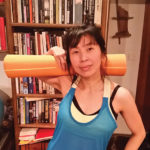
Do you feel burnt out? Feel like giving in or giving up? Did your training go out the window, as the restrictions and the darker days came back? Then this month’s column is for you – and me, and everybody else who could use an extra tool to make more lemonade of the many lemons life have thrown at us lately!
Life can be trying at times for the most of us. In our time right now, living with a pandemic caused by the Covid-19 virus that science haven’t cracked the code to yet, life can seem more than trying on top of everything else.
This is partly due to the fact that we are facing new challenges, which we didn’t sign up for, yet have to live with and overcome. And of course some of us will feel scared or anxious in the face of all the unknowns. It’s nothing to be ashamed or frightened of. Fear of the unknown is an ancient instinct that kept us alive throughout human kind’s history. Fear for the unknown makes most of us think twice before we act; and that can save lives.
I’ve always thought mental fitness was important; back when I was into powerlifting, we often talked about having the mental upperhand on the iron. Meaning that if you started to think too much about the weight you were lifting, the iron would win, and you would fail your lift. Likewise being too scared before stepping into the ring could be paralysing instead of sharpening of your senses.
In both cases, the mindset was the trigger point. All the practice was done, physically you were ready for battle, but the mental edge often decided if you won or lost.
Daily life doesn’t often have ‘pivotal moments’ that culminate months of practice, so I used to only associate Mental Fitness with competition; however mental fitness or strength is important in everyday life as well, especially in a time with a lot of unknown factors.
My first step into everyday mental fitness, was reading a friend of mine Jeppe Aagaard’s advice about overcoming fear. Jeppe is a successful coach and speaker into motivation, meditation and change, based on psychology and brain science. His advice was concrete and easy to use from the get go: ‘If you find yourself scared or anxious, ground yourself by feeling the ground under your feet. Feel your soles and feel how they connect to the ground beneath you. Feel the surface of what you’re standing on and within, soon your fears and anxiety will have left you.’
I felt kind of blown away by this short, powerful message. It is so doable and when you think about it, a fantastic way to ground yourself, to lose the stuff that makes you scared or anxious; simply by moving your focus from what is causing the fear, to something as tangible as the soles on your feet and the ground that you connect with.
As time has passed since the first lockdown this year, like many others, I have lost some of the goals for my training. Races got cancelled and restrictions made it more difficult to train. Crazy destructive stress and other outside factors also entered my life, and for the last month or so, I’ve been at loss as to how to structure my training (and other life goals) and even how to stay motivated.
I’ve been looking more into the tools of mental fitness – especially as an aid for physical training and exercise, to help me out of this jam. I’d like to share with you some of the advice I’ve found that has made a difference for me.
1. Make a schedule and hang it up: A visual chart over the week’s training sessions (or your normal week/work – study goals) will help you prepare mentally and practically for what’s next. When you’re prepared, it’s easier to stay committed – and you can also cross sessions out, as you go through the week and follow your progress. Important: Hang it where you will see and read (some of) it every day. Mine hangs next to my coffee cups cupboard – a place I look at every day.
2. If you’re stressed, find peace by inhaling through your nose while counting to four; exhale through your mouth (make it into a round shape, as if you exhaled through a straw) while counting to four. Repeat until you feel your body is relaxing and letting go of the stress, now your mind and body are ready to focus on the solving the problem at hand, instead of being stressed out by it.
3.Teach your skills. Nothing sharpens our knowledge so much, as having to explain it to someone else. I’ve been lucky and found a running partner (who is relatively new to fitness and training) who asks me a lot of good questions. Her questions have kept me on my toes, both remembering and looking into new knowledge to share with her. So share your passion, teach someone your favourite recipe, or garden with them. If you don’t feel like you have anyone in close in your life to teach, look into your community. Maybe your knowledge is sought after somewhere? Or set up a blog, documenting and showcasing your skills. Both in real life and electronically – explaining your knowledge will be good brain fitness.
4. Find a community. I think that I write this in every other column, but I can’t stress how important it can be to have other people to share your passion with. And even if training is more of a necessary evil than a passion, sharing it with others will: Make it more interesting – thus more motivating, more committed, as if you skip, you not only let yourself down, but also your training friend(s); and if you do have a competitive side to you, training with others, will most likely make you train harder and better than you would on your own. Due to restrictions, it might be hard to find your tribe in your community, but if you got a computer or phone with internet access, look online. You are sure to find someone to relate to. Stimulating conversation can be good brain fitness too.
I’ll leave you with a handful to other brain-fitness tools that are less related to physical fitness, some of them also perfect for indoor activities in the coming months:
• Memory games/ activities
• Jigsaw puzzles
• Learn a new dance (coordination and memorisation to music)
• Crosswords/ Sudoko activities
• Learn a new language
• Learn to play an instrument
• Use all your senses
• Get 30 minutes of daily exercise. Aerobic exercise such as running or biking is recommended, as it gets the blood pumping into all areas of the body, including the brain.
Stay active – both mentally and physically through the ‘lockdown’ and you’ll come out stronger on the other side.
Questions, comments etc. are as always welcome at:
taniaskitchenfitness@gmail.com or via Instagram:
@trainwithadane



